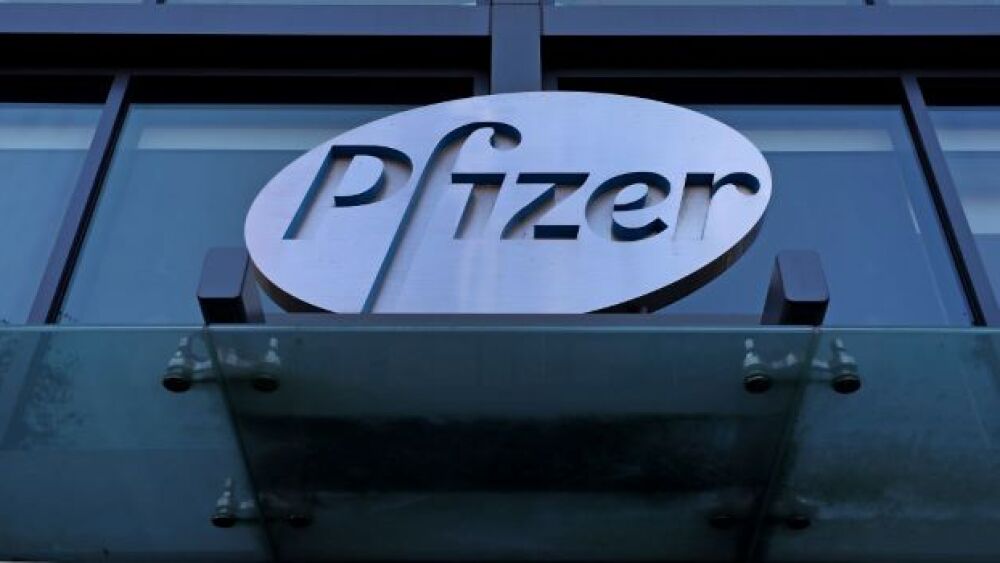Pfizer is leveraging its funding and experience with vaccines, developing its meningococcal, flu, and RSV vaccines. It also announced its venture investment in Nimbus Therapeutics.
David L. Ryan/The Boston Globe via Getty
Pfizer is leveraging its funding and experience with vaccines for meningococcal, flu and RSV to further expand its presence in the field.
Meningococcal Vaccine in Adolescents Hits All Endpoints
Pfizer’s investigational pentavalent meningococcal vaccine in people ages 10 through 25 hit all primary and secondary endpoints in a Phase III clinical trial.
The vaccine (MenABCWY) is designed to protect against five serogroups: A, B, C, W and Y. At this time, MenACWY and MenB vaccines are licensed separately.
The MenABCWY vaccine demonstrated non-inferiority to currently licensed vaccines for all five serotypes in the trial. Patients were given either two doses of MenABCWY or two doses of Trumenba and one dose of Menveo. MenABCWY also performed at least as well (non-inferiority) for serogroups A, C, W and Y compared to a single dose of Menveo.
A vaccine against five serotypes “has the potential to help simplify what is currently a complex meningococcal vaccination schedule in the U.S. and improve vaccine coverage,” stated Annaliesa Anderson, Ph.D., SVP and CSO, vaccine research and development at Pfizer.
Pfizer Launches Phase III Trial of mRNA Flu Vaccine
Pfizer dosed the first patients in a Phase III trial of a quadrivalent mRNA influenza vaccine. The study is expected to test the shot in about 25,000 healthy adults in the U.S.
The vaccine uses similar technology to that used in the Pfizer-BioNTech COVID-19 vaccine, leveraging modified messenger RNA (modRNA and mRNA) that codes for antigens found in four circulating influenza virus strains identified by the WHO.
Pfizer notes that flu vaccines on the market typically pick a single most probable match. This confers about 40% to 60% protection, which can be even lower if the dominant strain that emerges is different.
“Our experience with RNA viruses and mRNA technology has given us an even deeper understanding of the opportunity to potentially provide more efficacious vaccines that could further reduce the yearly rates of the severe outcomes of viral disease like flu, including hospitalization and death,” Anderson noted.
Pfizer Prepares FDA Submission for RSV Vaccine
Pfizer is preparing to submit a New Drug Application (NDA) to the FDA for its experimental respiratory syncytial virus (RSV) vaccine. The company reported positive Phase III data in late August.
In the clinical trial, the vaccine demonstrated 85.7% efficacy in people 60 years and older. The candidate is made up of recombinant RSV prefusion F from subgroups A and B.
NIH research informed the development of the vaccine. The NIH discovered that RSV leverages the perfusion F crystal structure to enter human cells. Pfizer then assayed different versions of the stabilized prefusion F protein until it found one that produced a strong anti-viral immune response.
In an August statement, Anderson noted Pfizer was looking forward to working with the FDA “and other regulatory agencies to make this vaccine candidate available to help address the substantial burden of RSV disease in older adults.”
Pfizer Ventures Invests in Nimbus Therapeutics
Pfizer’s investment arm, Pfizer Ventures, participated in a $125 million private financing of Cambridge, Mass.-based Nimbus Therapeutics.
Nimbus focuses on using its computational drug discovery engine to identify and develop small molecule drugs for immunology, oncology and metabolic diseases.
Jeb Keiper, CEO at Nimbus, told BioSpace, “With this financing Nimbus is well-positioned to complete the ongoing Phase IIb clinical trials of our TYK2 inhibitor in plaque psoriasis and psoriatic arthritis and advance this candidate into Phase III trials. We will additionally look to initiate trials of this candidate in inflammatory bowel disease and lupus, two indications where continuous, high inhibition of TYK2 is believed to be critical.”
“Finally,” he added, “we see great promise in our oncology programs, and these funds will help support the ongoing HPK1 Phase I/II clinical trial as well as preclinical development of our earlier-stage pipeline programs.”
Featured Jobs on BioSpace





